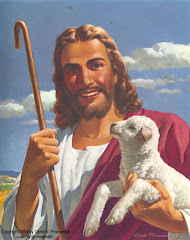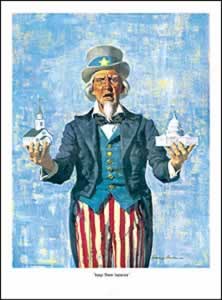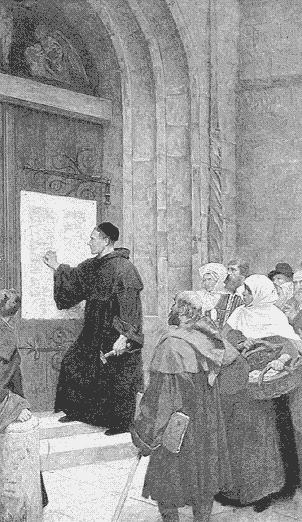Well over 100 years a go, the world received the merciful warning: "Let the principle once be established in the United States that the church may employ or control the power of the state; that religious observances may be enforced by secular laws; in short, that the authority of church and state is to dominate the conscience, and the triumph of Rome in this country is assured." GC 581. This July 2000 article clearly bears out the principle "that the church may employ or control the power of the state" has been solidly established. Thus we have yet further warning that Bible prophecy is fulfilling with stunning speed and that the triumph of Rome in the United States in assured.
from a post on Endrtimes
Twenty-five Years of Theocratic Influence - repeated attempts by the Catholic Church to influence the US government in issues involving abortion, various medical technologies, and homosexuality
In 1975 the Vatican began organizing a major political campaign to reverse Roe v. Wade. Few people at the time knew the origin of the campaign to end legal abortion through control of the U.S. presidency, Congress, and Supreme Court. But it has since become only one of many direct interventions by the Vatican over the last quarter century to establish a theocracy in the United States.In 1976 sixteen Catholic leaders headed by Archbishop Joseph Bernadin met with presidential candidate Jimmy Carter to press him to appoint Roman Catholics to key positions in his administration in return for not endorsing his opponent, Gerald Ford, in the coming election. Carter agreed and appointed, among others, John J. Gilligan to the cabinet post supervising the Agency for International Development (AID), thus ending the fourteen-year tenure of Dr. R. I. Ravenholt with that agency. It was AID that had provided family planning assistance to people in other countries.
In 1980 Senate Foreign Relations Committee Chair Frank Church proposed an amendment to the Foreign Assistance Act, stating, "Catholics ... are requesting that any aid program that we may embark upon in any foreign land include information and services which relate to and support natural family planning methods."
In 1984 the Reagan administration agreed to the Vatican's request to announce at the United Nations World Conference on Population in Mexico City that the United States was reversing its many years of commitment to international family planning. The administration then withdrew funding from the United States Fund for Population Activities and the International Planned Parenthood Federation.
In 1985 Mother Teresa came to the United States to lobby Congress against passage of legislation that would require family planning providers to give access to all family planning methods. The following year the U.S. Catholic Conference lobbied Congress to stop funding contraceptive research and to make natural family planning--supported by the Vatican--the preferred method of family planning.
In March 1987 the Vatican then issued an "Instruction on Respect for Human Life in Its Origin and on the Dignity of Procreation," which opposed at least fourteen current medical technologies, including artificial insemination, the freezing of embryos, and prenatal diagnosis, including the use of amniocentesis and ultrasonic techniques. The Vatican defended these restrictions "as subject to the all-holy laws of God: immutable and inviolable laws which must be recognized and observed."
But the subordination of women is only one goal of the Vatican's direct interventions. In 1980 the U.S. Catholic Conference enlisted the aid of Marian Wright Edelman of the Children's Defense Fund to secure the passage of the Act for Better Child Care with language that authorized government funds for after-school care in parochial schools using teachers from the schools as child care providers. The law as finally adopted also includes an amendment permitting government funding certificates to be used for child care that includes religious instruction or worship.
Ten years later the Catholic bishops decided to launch a major campaign to secure government aid for school choice, including the use of vouchers to provide tax funds for parochial schools. The bishops' plan called for the formation of diocesan, state, and national parents' organizations to lobby for government funds for Catholic schools. Prior to this 1990 decision, the Catholic hierarchy had lobbied successfully for a Minnesota law allowing parents of parochial and private school students to deduct $700 per child in high school and $500 per child in elementary school from their state income tax for tuition, textbook, and transportation expenses.
In 1986, when a bill to guarantee civil rights to homosexuals was before the Chicago City Council, "the political consensus was that it would pass with the votes of at least thirty aldermen," wrote Lawrence Lader in his book Politics, Power, and the Church. Lader continues, then Cardinal Bernadin "condemned the bill in violent language, and it was defeated thirty to eighteen."
Such successes led the Vatican to become even bolder. On June 25, 1992, it released a statement to all U.S. bishops which began, "Recent legislation has been proposed in some American states which would make discrimination on the basis of sexual orientation illegal." The Vatican then provided a list of categories for which discrimination should be legal, including teachers, coaches, tenants, adoption and foster care personnel, and the extension of company health benefits to an employee's homosexual partner.
On March 25, 1995, Pope John Paul II intervened directly in U.S. government with his encyclical Evangelium Vitae, which includes explicit instruction to obedient Catholics in Congress, state legislatures, and even the U.S. Supreme Court:
No circumstances, no purpose, no law whatsoever can ever make licit an act which is intrinsically illicit, since it is contrary to the law of God which is written in every heart, knowable by reason itself, and proclaimed by this church.
Abortion and euthanasia are thus crimes which no human law can claim to legitimize. There is no obligation in conscience to obey such laws; instead there is a grave and clear obligation to oppose them by conscientious objection.
In the case of an intrinsically unjust law, such as a law permitting abortion or euthanasia, it is never licit to obey it, or to take part in a propaganda campaign in favor of such a law, or vote for it.
In addition to numerous direct interventions, the Vatican uses other methods to ensure the pope's ability to intervene in the affairs of the United States and in various Catholic institutions. According to a 1989 report in the National Catholic Reporter, a new fidelity or loyalty oath must be "taken with hands on the Bible, requiring teachers in any universities whatsoever who teach disciplines which deal with faith or morals" to swear obedience to past and future proclamations from the Vatican and bishops. The oath says in part:
I adhere with religious submission of will and intellect to the teachings which either the Roman pontiff or the College of Bishops enunciate when they exercise the authentic magisterium, even if they proclaim those teachings in an act that is not definitive.
The Vatican also maintains control through the presence of its own representative in Washington, D.C., known as the papal nuncio or legate. Still another method of control is through required visits by U.S. bishops to the Vatican. On one such visit by a group of U.S. bishops on June 27, 1998, the pope told them:
The notion of freedom and personal autonomy is superficially attractive, endorsed by individuals, the media, legislature, and the courts.... Yet it ultimately destroys the personal good of individuals and the common good of society.... As bishops you have to teach that freedom of conscience is never freedom from the truth but always and only freedom in the truth.... The Church is preserved in the truth and it is her duty to give utterance to and authoritatively to teach that truth.
In its attempts to control U.S. political life, the Vatican is trying to speak not only for obedient Roman Catholics but for others who may or may not agree with Catholic doctrine. The Vatican's attempts to establish a theocracy in the United States are bolstered by a wide range of religious personalities who agree with papal directives on patriarchy, government funding for religious institutions, ending church-state separation, and other issues.
Will they prevail? Wherein is the hope for democracy? It is difficult to predict. However, the upcoming presidential and congressional elections are the perfect opportunity for progressive Catholics, Jews, humanists, and others to voice their opinion on the matter.
John M. Swomley has a Ph.D. in political science and international affairs from the University of Colorado and is professor emeritus of social ethics at St. Paul School of Theology in Kansas City, Missouri. Endrtimes

















0 comments:
Post a Comment